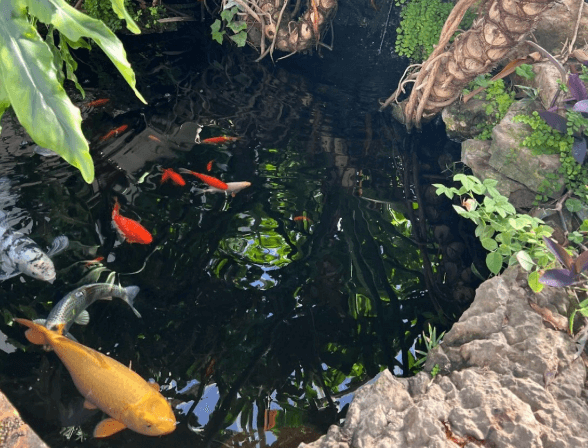Why Your Pond Needs a Strong Pond Filter for Healthy Fish

A beautiful pond with bright, happy fish begins with one essential component: a strong pond filter. Clear water doesn’t happen by chance — it requires constant cleaning and balance. Just like humans need clean air, fish need clean, oxygen-rich, and toxin-free water to survive. A powerful pond filter acts like a life-support system for your pond, making sure water stays healthy, clear, and safe for your fish. Without the right pond filter, waste builds up quickly, leading to cloudy water, algae, foul odours, and sick fish. In this guide, you’ll learn why using a strong pond filter is the smartest decision for long-term pond health, fish welfare, and easy maintenance.
What a Pond Filter Actually Does for Your Pond
A pond cannot clean itself — nature needs help. A pond filter works 24/7 to remove waste, balance water quality, and support fish health. Even if water looks clean on the surface, invisible toxins form inside the pond. A pond filter keeps the water clean, fresh, and safe so your fish can breathe well, grow, and live longer.
A well-designed pond filter constantly tackles fish waste, leftover food, dirt, and harmful chemicals. It prevents toxic buildup, keeps water clear, and provides a stable environment where fish and plants can thrive together.
The Three Important Filtration Stages in a Pond Filter
A complete pond filter combines three types of filtration to maintain a healthy ecosystem. When these three work together, your pond stays clear, balanced, and low-maintenance.
Mechanical Filtration: Removing Waste from the Water
Mechanical filtration is the first job of a pond filter. It catches physical waste such as fish poop, fallen leaves, insects, dirt, and leftover food. Without mechanical filtration, this waste sinks to the bottom and turns into sludge, which causes cloudy water and bad smells. The mechanical stage in a pond filter keeps the water visibly clean and prevents dirt from building up.
Biological Filtration: Balancing Water with Good Bacteria
This is where beneficial bacteria do their job. The biological stage of a pond filter converts harmful chemicals like ammonia and nitrites into safer substances. Fish release ammonia through their waste, and if it builds up, it can burn their gills and weaken their immunity. Biological filtration provides a safe home for helpful bacteria inside the pond filter, keeping the water balanced and fish friendly.
Chemical Filtration: Polishing and Freshening the Water
The chemical stage of a pond filter uses special materials like activated carbon to remove toxins, discolouration, and odours. It improves clarity and freshness, especially after medication or algae treatment. This makes the water look sparkling and smell clean, giving your pond a fresh and natural appearance.
Why a Strong Pond Filter Is Essential for Fish Health
Your fish depend completely on the quality of the water they live in. Poor water quality causes stress, breathing problems, and diseases. A strong pond filter protects your fish by:
- Keeping ammonia and nitrites at safe levels
- Improving oxygen levels through water movement
- Controlling algae growth that blocks sunlight and oxygen
- Reducing stress and infections among fish
- Maintaining stable pH and clean water chemistry
Healthy, well-filtered water means fish stay active, colorful, and live longer. A weak pond filter may keep the water “looking” clear, but it cannot handle toxins — and fish may silently suffer.
Major Benefits of Using a Powerful Pond Filter
Choosing a strong pond filter offers many long-term advantages. It creates a clean, low-maintenance environment that keeps fish comfortable and your pond looking beautiful.
- Cleaner, clearer water every day
- Less frequent water changes needed
- Active, bright, and healthy fish with stronger immunity
- Reduced algae growth and fewer harmful bacteria
- Less sludge, bad smell, and debris buildup
- Balanced ecosystem with healthy fish, plants, and micro-organisms
With a powerful pond filter, your pond stays in great condition with less work from you.
Warning Signs That Your Pond Filter Needs an Upgrade
If your pond shows any of the following symptoms, your current pond filter may not be strong enough:
- Water turns cloudy, green, or dirty quickly
- Bad odours or rotten smell rising from the pond
- Fish gasping for air near the surface
- Fast algae growth on rocks or pond walls
- Fish getting sick more often
These signs mean your pond filter cannot handle the waste and is not keeping the water healthy.
How to Choose the Right Pond Filter for Your Pond
Every pond has different needs. To choose the best pond filter, consider the following points:
- Pond size and litre capacity
- Number and type of fish (Koi need stronger filtration)
- Sun exposure and plant growth
- Filter flow rate and speed
- Whether the pond filter includes all three filtration types
A smart tip: Always choose a pond filter designed for a pond larger than yours.
For example, if your pond is 1,000 litres, choose a pond filter for 1,500–2,000 litres to ensure strong performance even as fish grow.
Extra Tips to Support Your Pond Filter for Best Results
A pond filter does the main work, but a few habits help it work even better:
- Avoid overfeeding fish — leftover food becomes toxic
- Add pond plants to increase natural oxygen
- Clean the mechanical sponge but avoid washing biological media too much
- Remove floating leaves and debris often
- Test water quality monthly
These small steps help your pond filter last longer and keep the pond healthy.
Conclusion: A Strong Pond Filter Brings Life and Clarity to Your Pond
A pond filter is not just a piece of equipment — it is the heart of your pond’s health. It keeps water clean, balanced, and safe, creating a stress-free environment for fish. With the right pond filter, your pond becomes clearer, easier to maintain, and more enjoyable to watch. It ensures your fish live longer, grow better, and stay vibrant. Whether you are starting a new pond or upgrading an old one, investing in a powerful pond filter is the smartest and most effective step toward a clean, beautiful, and healthy pond.
Frequently Asked Questions
How often should I clean my pond filter?
Clean the mechanical part of the pond filter every 2–4 weeks. Avoid over-cleaning the biological part to protect helpful bacteria.
Can fish live without a pond filter?
Not for long. Fish may survive for a short time, but without a pond filter, toxins build up quickly and harm fish health.
Do small garden ponds also need a pond filter?
Yes. Even small ponds need a pond filter to prevent waste buildup, maintain clean water, and keep fish healthy.
What size pond filter should I choose?
Choose a pond filter designed for a pond larger than your current pond size for stronger and more reliable filtration.
Does a pond filter improve oxygen levels?
Yes, because a pond filter improves water circulation. Adding a waterfall or air pump increases oxygen even more.




